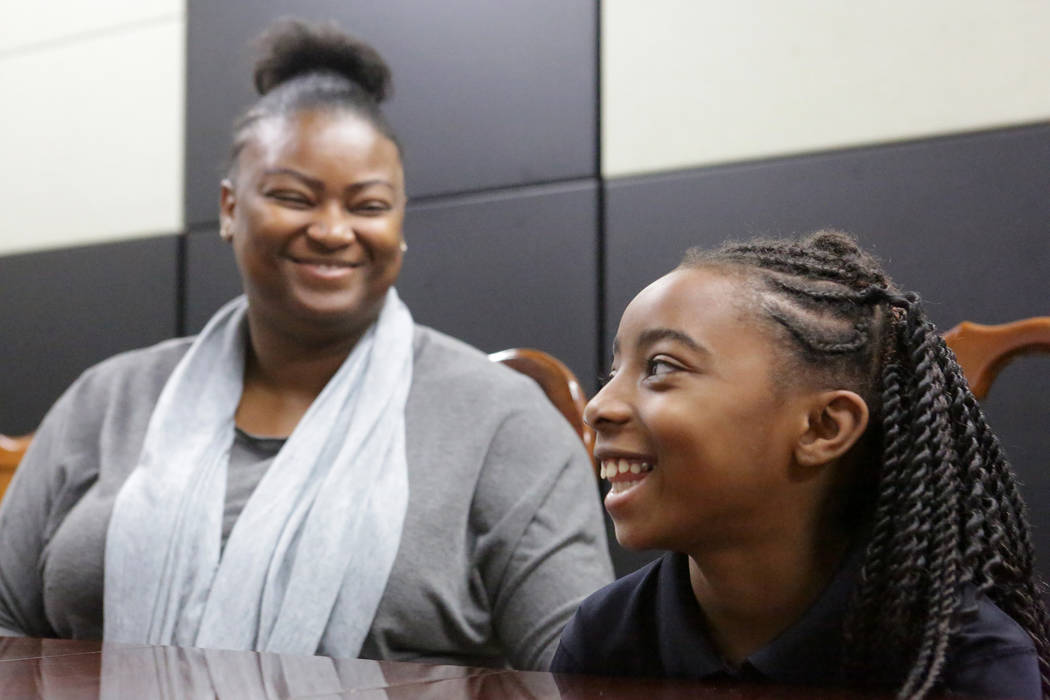Parents sue over Nevada’s cap on tax-incentive-funded scholarships

Parents whose children attend private schools on scholarships funded by state tax incentives are suing over a cap on the program imposed during the recent legislative session.
The Opportunity Scholarship program, launched in 2015 when Republicans controlled both the state Assembly and Senate, was to grow by 10 percent every year under the initial legislation. But Democrats, who took control of the Legislature prior to the 2019 session, eliminated that provision and capped the tax incentives at roughly $6.7 million — the same amount the program received last year.
The program provides scholarships to low-income families that are funded by tax incentives given to businesses that pay the modified business tax.
While legislators this session funneled a one-time infusion of an extra $9.5 million to ensure there would be enough money for current students, at least one of three organizations that grant such scholarships has informed parents that it can’t fund all current students this school year.
The three plaintiff parents say the cap leaves them uncertain whether their children can continue to attend their private school.
“If they repeal that (tax incentive increase) and take that back, my fear is these people will not donate anymore,” said Keysha Newell, whose 7-year-old daughter attends Innovation Academy in Las Vegas and who hopes to one day send her son there, too. “And I will not have the option to get the scholarship anymore.”
Two-thirds argument
The lawsuit, expected to be filed on Thursday morning by the Institute for Justice, a nonprofit that advocates for school choice nationwide, argues that the legislation that enacted the cap constituted a tax increase.
Since eliminating tax credits ultimately increases revenue, the legislation imposing the cap — Assembly Bill 458 — was a revenue-raising bill that required a two-thirds supermajority of votes in each house of the Legislature, the institute argues.
Joshua House, an Institute for Justice attorney, said the cap also means some organizations aren’t going to have enough money to sustain current students over the long term, said.
“If they’re young enough, they’re not going to have enough funding in the long term no matter how much short-term funding they’ve received in this next biennium,” House said.
Other plaintiffs in the lawsuit include the AAA Scholarship Foundation and businesses who use the tax incentive as plaintiffs. A draft of the complaint names the Department of Education and the Department of Taxation as defendants.
In a memo to scholarship organizations in July, the state Department of Education clarified that funding is limited to current students only — unless the organization “reasonably expects” to have enough money to fund new students until they graduate from high school.
The Departments of Education and Taxation declined to comment due to pending litigation.
Assembly Speaker Jason Frierson, D-Las Vegas, declined to comment and directed questions to the Legislative Counsel Bureau. The bureau also declined to comment.
In a previous interview with the Review-Journal, Frierson said that legislators worked with the office overseeing the program to ensure that enough money was appropriated to allow current recipients to continue receiving the scholarship.
But the Education Fund of Northern Nevada, one of the three nonprofits that administer the program, sent a memo in July to parents saying that it only had enough money to fund high school students already enrolled. Other students who previously received a scholarship did not receive one this year.
“The inconsistency of the Nevada Legislature in regards to the Opportunity Scholarship program makes long-term decisions on our part impossible,” the letter to parents read.
But the AAA Scholarship Foundation, which apportioned its money out over a period of years, is still awarding scholarships to current students. It has even accepted applications for those on a wait list who were awarded scholarships through different organizations last year and siblings of current recipients.
The foundation is still hoping that the cap is removed.
“These programs need to be allowed to grow because of things like siblings being added to the program, and others who would like to join the program who found themselves in a school that’s not really working for them,” said Kim Dyson, president and CEO of the foundation.
It’s unclear whether the third scholarship organization, Dinosaurs and Roses, has enough funding to provide scholarships to past recipients.
Future growth at stake?
The program has grown significantly since the 2015-16 school year, when 541 students were awarded $3.2 million in scholarships, compared with the 2,306 students awarded over $11 million in 2018-19, according to a November 2018 Review-Journal analysis. The program got an additional $20 million in 2017 — the result of another political deadlock over school choice. This year, the maximum amount a child can receive is $8,262.
The extra $9.5 million appropriated this year for the Opportunity Scholarship program also is in question due to a lawsuit brought by Senate Republicans over Senate Bill 551.
The bill, which eliminated a scheduled decrease in the state’s modified business tax, included the one-time funding boost for the program.
That lawsuit also claims that the Legislature needed to pass that bill on a two-thirds vote.